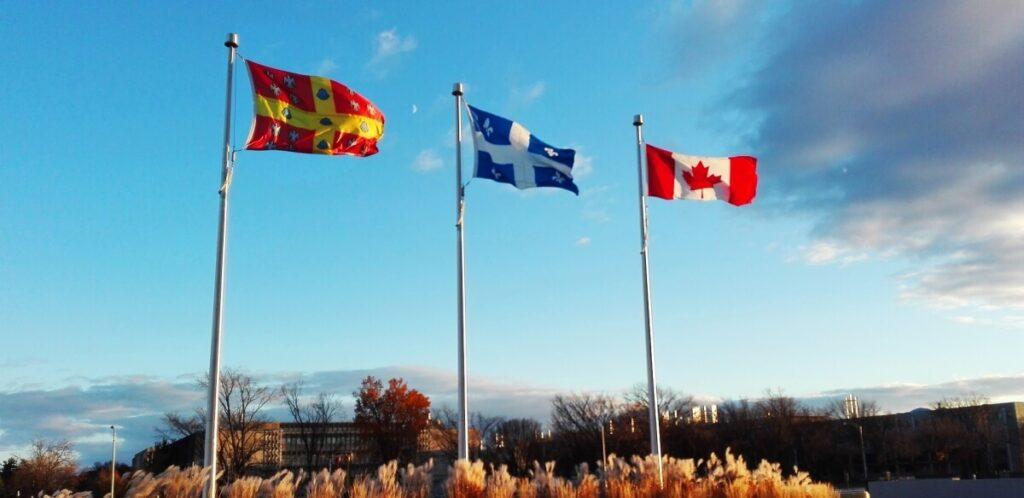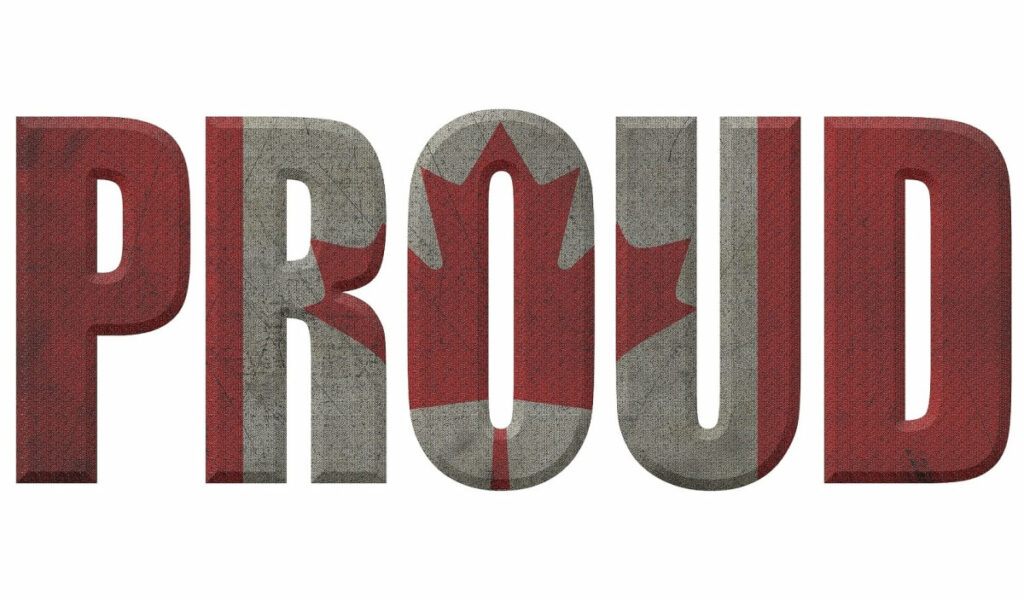As we have seen in previous posts, French is one of the most widely spoken languages around the world. It is spoken not only in France, but also in other parts of Europe, Africa, Canada, and other countries. Something that has always been up for debate is the fact that French varies among French-speaking countries.
Probably, the most well-known version of French outside of France is Québécois. But what is it? Where do they speak it? And most importantly, what are the main differences between French and Québécois? Well, if you’d like to find out, then keep on reading. Allons-y!
What Is Québécois?

For starters, let’s explain this. Québécois is, in simple terms, Canadian French. Sure, there is Acadian French, but when people speak about Canadian French, in most cases, they refer to Québécois. Québécois is the kind of French spoken in the province of Québec. It is NOT another language, contrary to what some people might believe.
To understand the importance of Québécois, we need to look at some numbers. French is one of the two official languages in Canada. It is the native language of over 7 million Canadians or 20% of Canada’s population. Furthermore, one of Québec’s cities is among the top 5 cities with the most French speakers worldwide: Montreal. That’s why we can’t just ignore this French version.
Both French and Québécois have evolved over the centuries, but their evolution processes were different. Québécois is closer to 17th-18th-century French than the French currently spoken in France. Probably due to Canada’s isolation from Europe, Québécois did not evolve the way continental French did.
So, Aren’t French and Québécois the Same?
Yes and no. French varies widely, even in France itself. When linguists refer to French, they mean Metropolitan French or the French spoken in Paris. It is the most popular version of French. Some people go as far as saying that it’s the standard or neutral French language, although that’s a controversial topic. If French differs among the different regions in France, what makes us think it would not differ from Canadian French on the other side of the world?
For the sake of comparison, we could say that the differences between French and Québécois are similar to those between British and American English. Although they’re the same language, they differ in pronunciation/accent, vocabulary, and idiomatic expressions. However, it’s not as simple as that. I believe the differences are deeper than those between BR/AM English. More on that later.
How Are They Similar?
Before looking at the differences, let’s see how they are similar. The major similarity between them is grammar. Although it may differ in some cases, when standard grammar is used, both French and Québécois are the same. The same French rules about gender, articles, prepositions, verbs, adjectives, etc. apply to Québécois. There is no turnaround.
That does not mean there aren’t any grammatical differences, but, in my opinion, they’re minimal or not as marked as the ones in other areas (vocabulary, pronunciation). Generally speaking, the grammar in both French and Québécois is the same. So, we’re good up to this point, right? Let’s take a look at the differences now.
Differences in Pronunciation
Oh, Québécois pronunciation. It is so much different from French. The latter has around 13 vowel sounds, while Québécois has more than 15. A couple of extra sounds can make a big difference.
Nasal sounds play a big role, too. Even though French is a nasal language by nature, Québécois is much more nasal. For example, in French, we pronounce in/un the same way. However, in Québec, that’s not the case. They pronounce in like an, which is something that doesn’t happen in France.
Consonant sounds differ, too, as is the case of T and D. Québécois speakers tend to add an S to T and a Z to D. For example, Canadians pronounce “tu dis” like “tsu dzi”. The French would never do that.
Québécois speakers also tend to omit the final sounds of words ending in R or NTE. For instance, they wouldn’t pronounce the final sounds of words like choisir or soixante.
There are many more differences in pronunciation we could discuss, but it would be a super long post. If you would like to learn more about Québécois pronunciation, I recommend you read this post.
Differences in Vocabulary
This is another important difference between French and Québécois. Québécois speakers still use words that have fallen out of use in France. For example, the French say “voiture” (meaning car), while Québécois speakers continue using the archaic word “char“, which comes from an old word for chariot. That is the case with many other words that were once used in France but now are only used in Canada.
Québécois also borrowed Amerindian words like caribou (reindeer) and maringouin (mosquito). In fact, the name of the province of Québec comes from an Algonquin word meaning “narrow passage” or “strait”.
Due to its geographical location, Québécois is heavily influenced by English. It’s not uncommon to adopt English words and use them in everyday speech. Think of words like “gomme” (bubblegum), “moppe” (mop), or “domper” (dump).
Québécois: More Than Just a Language

Québécois is a matter of cultural identity. For many years, the descendants of the French in Canada called themselves French Canadians. However, they started to identify themselves as Québécois in the 1960s. They are proud of their French heritage and embrace it dearly. That, of course, includes the language.
Even though Québécois has strong English influences, at the same time, there is a struggle to avoid anglicisms and use French words instead. That’s why French Canadians prefer the terms courriel, arrêt, fin de semaine, and stationnement over email, stop, weekend, and parking, respectively. The French have adopted a lot of English words, but the Québécois are more reluctant to use them.
The Québécois try to keep their Frenchness as much as possible to differentiate themselves from Anglos. Their cultural differences are so big, that they tried unsuccessfully to secede from Canada in 1995.
Can the French and Québécois Understand Each Other?
For the most part, yes, they can understand each other. The Québécois can easily understand European French and, in most cases, the French can understand Québécois. Unless a Québécois person has a strong accent and/or uses a lot of Québécois words/idioms, a French person shouldn’t have major trouble understanding him.
Some Québécois people try to change their accent when they travel to Europe and stick to standard French to avoid misunderstandings with their interlocutors. Even though they can be understood if they spoke with their original accent, some people still prefer to use a French accent.
In the video below, the international Canadian singer Céline Dion speaks with both French and Québécois accents. Even though she tries to hide her real accent, her Québécois accent is evident during most of the interview. Can you notice the differences between her accent and that of the interviewer?
Which One Should You Learn?
At this point, you may be asking yourself which version of French you should learn. Should you learn European French or Québécois? Well, it really is a matter of preference.
Most French material is in European French. Think movies, music, etc. It is easier to learn it because there are way more resources available compared to Québécois. However, that does not mean you should stay away from Québécois. In fact, many people move to Canada to learn French/Québécois. Europe is not the only option.
I remember when I first started studying French. All my teachers and tandem partners were European. My ear became used to European French. However, when I visited Canada and spoke to locals, I had a hard time understanding them. Their accent was so different! That’s why I recommend starting with European French and then switching to Québécois. But that’s just me. You can do the opposite. Nothing is set in stone.
Conclusion
French and Québécois are so similar and different at the same time. They have the same origin, but their evolutions have been different. Although they are mutually intelligible, it’s more common for a French person to not understand Québécois than the other way around.
Today we saw some key differences between French and Québécois like vocabulary and pronunciation. Not just that, we also learned that Québécois is a matter of cultural identity. It’s more than just a language.
At the end of the day, it’s up to you which version you should learn. None is better or worse than the other.
I hope you enjoyed this article. Please leave your questions and comments below, and I will do my best to answer them all. Salut, les amis!
Let's Learn French! Are you ready to take your French to the next level? I'm glad you are! Whether you are a beginner or an intermediate/advanced learner, I can recommend a few options for you. For starters, if you're someone who likes to study on his own, I recommend the following programs: Busuu Mondly Rocket Languages However, if you would like to hire a teacher/tutor, I recommend you try the following: italki Lingoda Preply Feel free to check my site to learn about more resources. Don't forget to check back often to learn more about the French language and culture. Salut!


This is a very good article I have just now found out the differences of these two languages. When I was in the US Airforce I spent four years in France and was stationed with the Van Dues the 22nd This was a unit from Quebec Canada and I did not speak French but relied on my Canadian friend to help me and I got to see a lot of the differences You speak of
Hey, Walt,
Yes, there are many differences. Did you get to learn French?
Thanks for commenting.
I love the Québécois. They are a proud people with a rich culture that dates back centuries. From their unique dialect of French to their hearty cuisine, there are many things that set the Québécois apart from the rest of Canada.
But perhaps the most defining aspect of Québécois culture is their fiercely independent spirit. For centuries, they’ve resisted domination by both the British and French empires, and today they continue to assert their distinct identity within Canada.
Hi, Bob,
It’s a complex topic indeed. It’s not just the language but a whole culture that refuses to disappear.
Thanks for commenting.
I had a few colleagues from France and Canada as well (Montreal) …
Anyways
I was wondering, is the difference between British English and American English, the same (more or less) as the difference between French French and Québécois?
Hey, Mike,
I would say it’s very comparable. However, I think the difference is greater in the sense that Canadians use words that the French don’t use anymore. Also, we have to consider that British English has a lot of influence from American English due to Hollywood movies and series.
Hope this answers your question. Thanks for commenting.